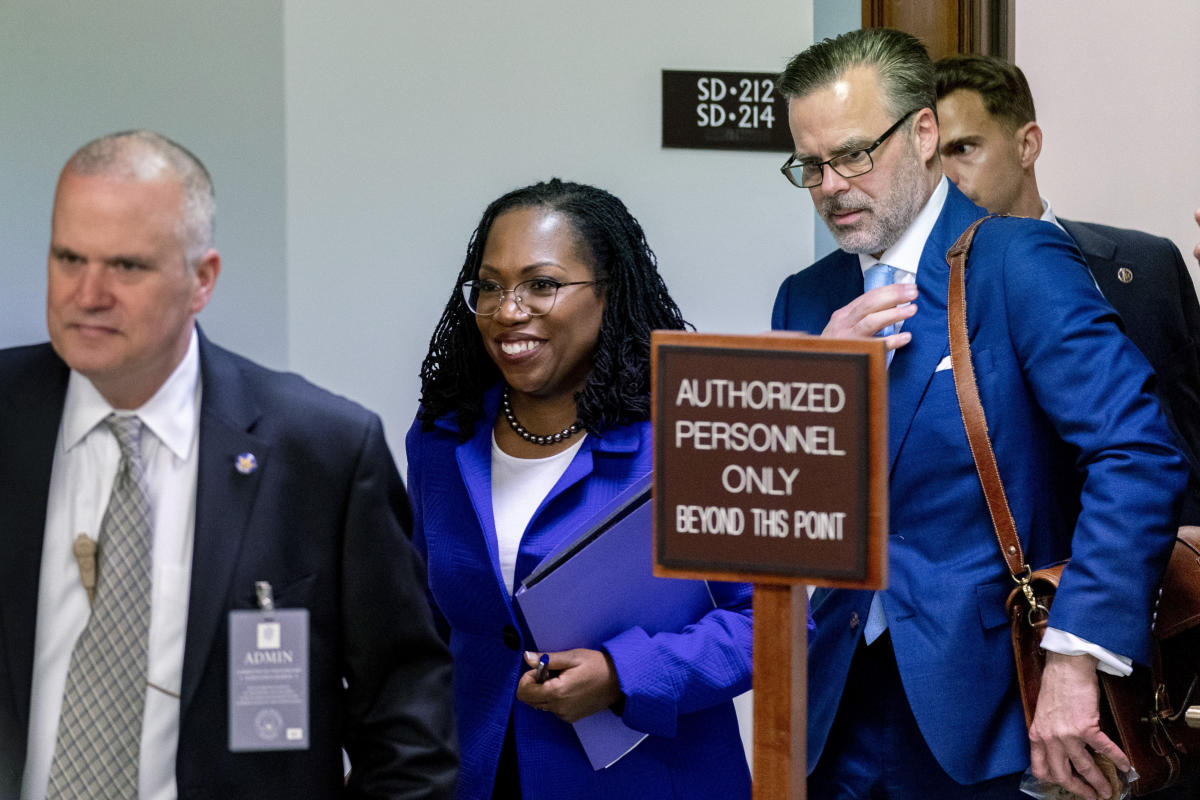
WASHINGTON (AP) — History was made the instant Judge Ketanji Brown Jackson appeared before the Senate Judiciary Committee, the first Black woman nominated to the Supreme Court.
President Joe Biden promised he would choose a Black woman for the job and the 51-year-old Harvard-trained Jackson emerged as an early favorite, having won support from the Senate several times before, including a year ago to be an appellate court judge. Democrats have the potential votes in the 50-50 Senate to confirm Jackson, to replace retiring Justice Stephen Breyer, even if all Republicans line up opposed.
Some takeaways from Monday’s session, the first day of Jackson’s confirmation hearing:
HISTORY IS MADE
“Today is a proud day for America,” said Sen. Dick Durbin, D-Ill., the committee chairman, as he opened the historic hearing.
It’s taken 233 years to arrive at this moment, the first Black woman nominated to be a justice on the Supreme Court, which once upheld racial segregation in America.
Yet as history is being made, it is also carrying echoes of an earlier ground-breaking era.
Senators on the Republican side are criticizing Jackson’s record as too soft on crime, much the way Southern senators in 1967 linked race and crime during a time of riots in cities nationwide when Thurgood Marshall, the storied civil rights lawyer, was nominated by President Lyndon B. Johnson to be the first Black justice.
Jackson would be the first federal public defender on the court, and Marshall as a civil rights lawyer worked around the country defending Black Americans often facing trumped up charges.
DEFENDING ‘GRAND EXPERIMENT OF AMERICAN DEMOCRACY’
Jackson told the senators that if confirmed to the court, she would work “to support and defend the Constitution and this grand experiment of American democracy.”
The judge’s own life story is part of that history. She told senators that she stands before them on the shoulders of giants — including her own parents, public school teachers, who left segregated Florida for a better life in Washington, D.C.
She was born in the aftermath of the civil rights era, and her parents gave her an African name — “Ketanji Onyika,” which they were told means “lovely one,” she explained. They taught her that unlike the barriers they faced, that if she worked hard, “I could do anything or be anything I wanted to be.”
The judge is no stranger to the committee, having been confirmed three times before. Senators have said over and again what a pleasure it has been meeting one-on-one with Jackson, who is open and engaging. Her family and friends sat behind her, including her husband of 25 years, surgeon Patrick Jackson, and two daughters. One of her daughters once drafted a letter to Barack Obama, saying her mom should be nominated for the court.
The audience also was filled with the nation’s leading civil rights leaders and representatives of the Congressional Black Caucus.
A judge now for the past 10 years, Jackson told the senators she decides cases from a “neutral posture” after evaluating the facts applying the law “without fear or favor.”
SENATORS CAN’T QUIT KAVANAUGH
The top Republican, Sen. Chuck Grassley of Iowa, insisted his side of the aisle won’t turn the weeklong-hearing into the “spectacle” of Brett Kavanaugh’s nomination in 2018, which exploded over allegations of sexual assault from high school. Kavanaugh denied the allegations.
Yet, senators on the Republican side kept referencing the Kavanaugh hearings, which blew up as Democrats brought forward the assault allegations and he delivered a blustery defense of beer-drinking and high school.
“This will not be a political circus,” assured Sen. Ted Cruz, R-Texas.
“No one is going to inquire into your teenage dating habits,” he said. “No one is going to ask you with mock severity, ’Do you like beer?’”
Republican who don’t have the votes to stop Jackson’s confirmation want to at least remind voters of that politically charged chapter, which many believe cost the Democrats Senate seats in that year’s election.
But as Sen. Richard Blumenthal of Connecticut said to Jackson, “This hearing really should be about you, not about us.”
IT’S NOT ABOUT RACE, UNTIL IT IS
Republican Sen. Lindsey Graham of South Carolina said during opening remarks that while he believes “the court should look like America” — giving a nod to Jackson’s historic nomination — he also signaled he won’t shy from asking hard questions of the nominee.
“‘We’re all racist if we ask hard questions.’ That’s not going to fly with us,” he said.
But the imagery is stark on the all-white, largely Southern Republican side of the aisle, as the mostly male senators question and criticize Jackson’s record, and demand a fuller accounting of her judicial philosophy.
“This is not about race,” Cruz said.
Durbin opened the hearing reminding the senators that Jackson isn’t the only one facing this moment in history.
“Consider how history will judge each senator as we face our constitutional responsibility to advise and consent,” he said.
JUDGING THE JUDGE, AND THE SENATORS
While Jackson is the one appearing before the Judiciary Committee, the senators are also being judged in how they handle her historic nomination — particularly those potentially running for president in 2024.
Potential presidential hopeful Sen. Josh Hawley, R-Mo., set the tone even before the hearings began, raising concerns that Jackson gave child pornography defendants lighter sentences than required.
“I’m not interested in trying to play gotcha,” Hawley said as he laid out his concerns Monday, “I’m interested in her answers.”
Fact checkers have said Hawley is selectively choosing the cases, including many in which prosecutors in fact also sought more lenient sentences than federal sentencing guidelines.
“There have been some accusations that we cherry-picked some of Judge Jackson’s criminal cases,” Grassley said. “Don’t worry. We’re going to talk about the other ones too.”
While Hawley jumped out in front with his questions, Cruz, Sen. Tom Cotton, R-Ark. and others are not ready to cede the spotlight during the hearings.




